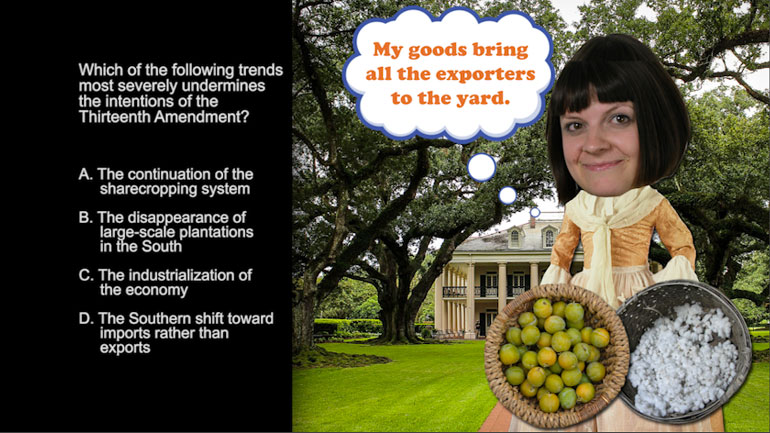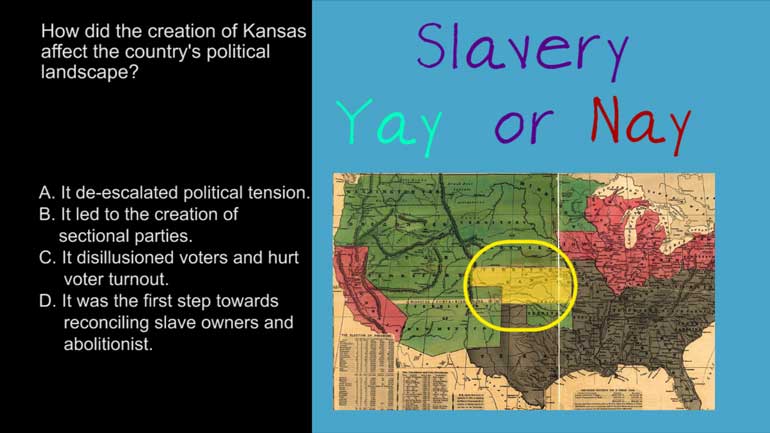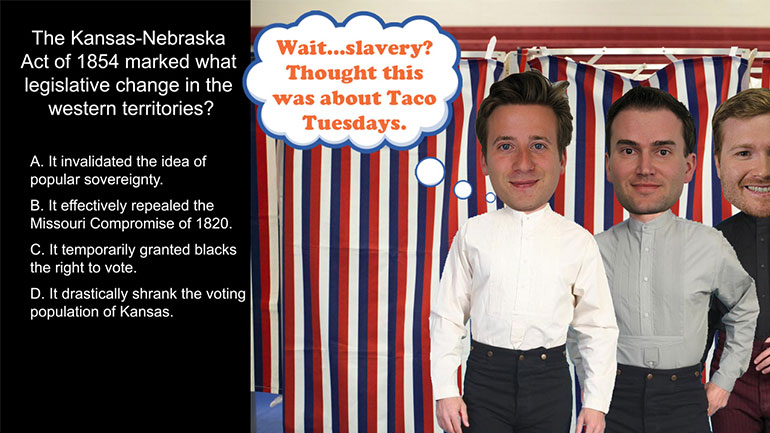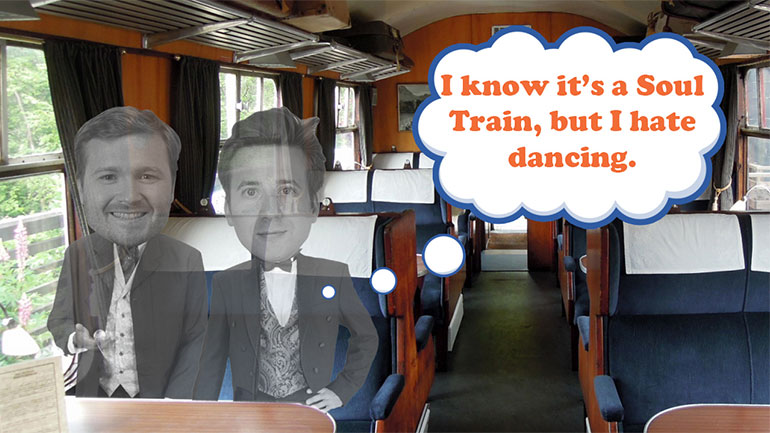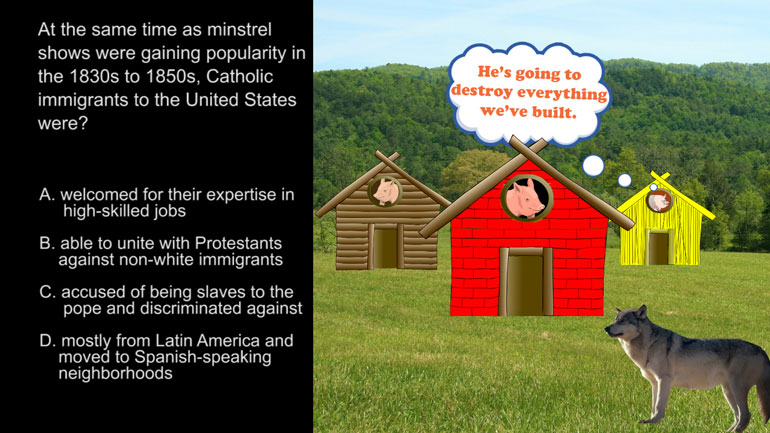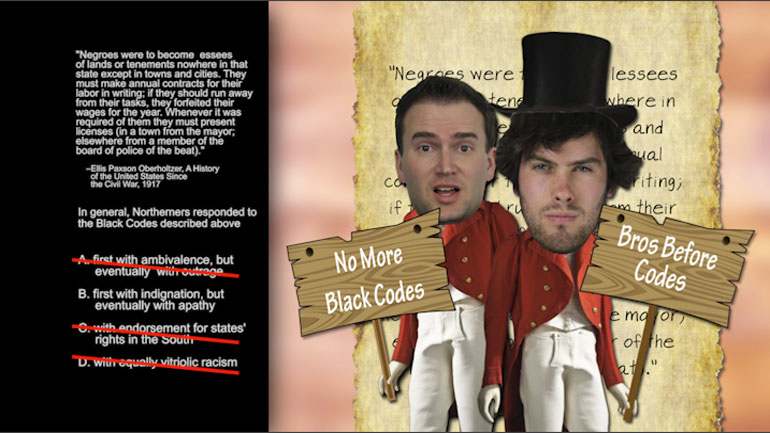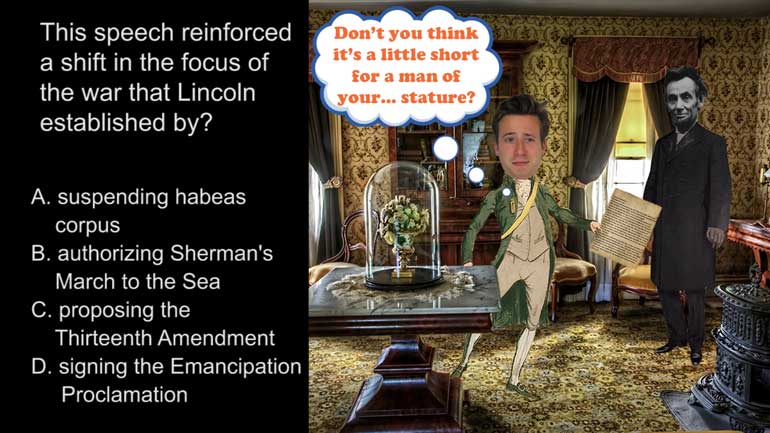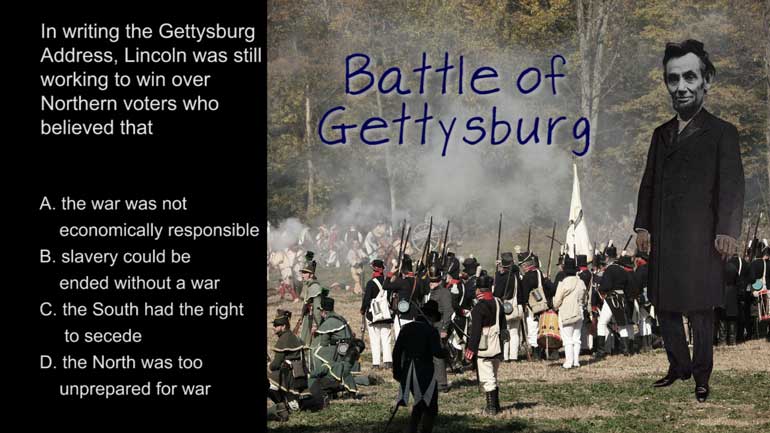ShmoopTube
Where Monty Python meets your 10th grade teacher.
Search Thousands of Shmoop Videos
Playlist U.S. History: 1848 – 1877 10 videos
AP U.S. History 2.3 Period 5: 1848-1877. Which of the following trends most severely undermines the intentions of the Thirteenth Amendment?
AP U.S. History 2.5 Period 5: 1848-1877. In general, how did Southerners react to the wave of Northerners who migrated to the South after the Civil...
AP U.S. History 1.1 Period 5: 1848-1877. Which of the following groups would be most likely to support the idea of Manifest Destiny?
AP U.S. History 2.5 Period 5: 1848-1877 200 Views
Share It!
Description:
AP U.S. History 2.5 Period 5: 1848-1877. In general, how did Southerners react to the wave of Northerners who migrated to the South after the Civil War?
Transcript
- 00:00
[ musical flourish ]
- 00:03
And here's your Shmoop du jour, brought to you by carpetbaggers,
- 00:07
portable floor decor for the modern woman.
- 00:10
Yeah.
- 00:11
All right, give this excerpt a read here, right here.
Full Transcript
- 00:14
All right.
- 00:15
In general, how did Southerners react to the wave of Northerners
- 00:18
who migrated to the South after the Civil War?
- 00:22
And here are your potential answers.
- 00:23
[ water glugs ]
- 00:24
[ mumbles ]
- 00:27
[ mumbling continues ]
- 00:29
All right, you know the big migration of former slaves
- 00:32
to the North following the war? Well, there was also
- 00:35
a big migration of Northerners coming down to the South.
- 00:38
Some of them were abolitionists relocating for the noble work
- 00:42
of improving access to education.
- 00:44
The not-so-noble were businessmen looking to profit
- 00:47
from the chaos following five years of destructive conflict.
- 00:50
So let's see which answer best describes how Southerners reacted
- 00:53
to the folks who rode that midnight train down to Georgia.
- 00:57
Well, in general, did Southerners react to the wave of Northerners
- 00:59
with the feeling that A - they needed the Northerners' technical knowledge?
- 01:03
Well, actually, the economy remained predominantly agriculture-based
- 01:06
in the years following the war, so there wouldn't have been
- 01:08
any big need to share in technical knowledge.
- 01:11
So it's not A. Did Southerners
- 01:13
B - welcome the Reconstruction aid Northerners provided?
- 01:17
Well, they say there's no such thing as a free lunch,
- 01:19
and in the Southerners' case, there were a whole bunch
- 01:21
of strings attached to the relief coming from the North.
- 01:24
So that knocks out B.
- 01:25
Would Southerners have C - appreciated that Northerners
- 01:28
would accept low wages?
- 01:30
All those Northern businessmen that flooded the region after the war, you kidding?
- 01:34
Well, they were looking for a quick buck in bottom-rate prices.
- 01:36
So low wages definitely were not on the table.
- 01:39
So it can't be C, either.
- 01:41
Which means that Southerners D - mistrusted Northerners
- 01:44
and accused them of exploitation.
- 01:47
Four years of fighting brewed a lot of bad blood,
- 01:48
so when Northerners flooded the region following their victory,
- 01:51
Southerners were none too pleased with what they found
- 01:54
regardless of the Northerners' intentions.
- 01:56
So D is the right answer, and it looks like Reconstruction
- 01:59
might have been a few tools short of a toolbox.
- 02:02
[ hammer bangs ]
Related Videos
AP U.S. History Exam 2.45. The journey shown on the map was an example of...what?
AP U.S. History Exam 2.26. This speech reinforced a shift in the focus of the war that Lincoln established by...what?
What did the Spanish messengers bring with them to North America? Hint: you probably wouldn't be thrilled to get this for your next birthday.
AP U.S. History Diagnostic 24. How did the United States choose containment over the National Security Council Report in Latin America?
AP U.S. History Exam 2.25. In writing the Gettysburg Address, Lincoln was still working to win over Northern voters who believed that...what?
